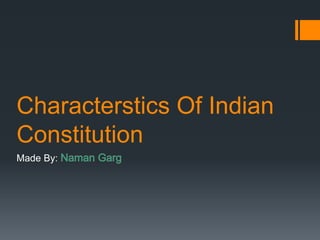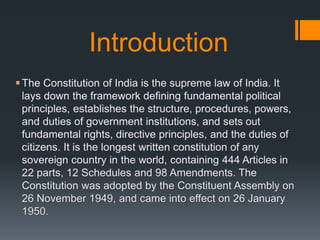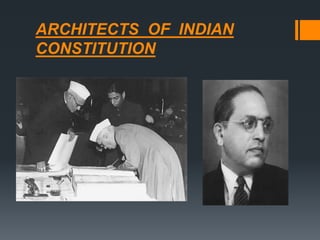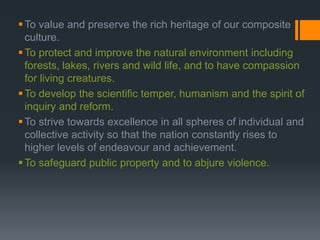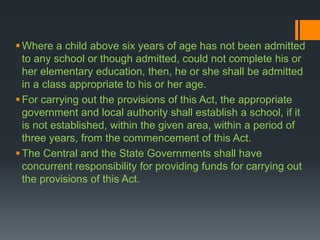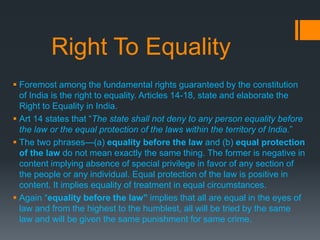Features Of constitution
- 2. Introduction
- 4. Salient Features The Constitution of India has some outstanding features which distinguishes it from other constitutions. The framers of our constitution studied other constitutions, selected their valuable features and put them with necessary modifications in our constitution. They succeeded doing this. The fact that the constitution, for last 59 years, has been working satisfactorily is a testimony to its quality and utility. Now we will discuss the salient features of our constitution one by one.
- 5. FUNDAMENTAL RIGHTS The Constitution of India guarantees six Fundamental Rights (listed in part III) to every Citizen. Right to Equality. Right to Freedom. Right against Exploitation. Right to Freedom of Religion. Cultural and Educational Rights. Right to Constitutional Remedies.
- 6. FUNDAMENTAL DUTIES To abide by the Constitution and respect its ideals and institutions, the National Flag and the National Anthem. To cherish and follow the noble ideals which inspired our national struggle for freedom. Uphold and protect the Sovereignty, Unity and Integrity of India. To promote harmony and the spirit of common brotherhood amongst all the people of India transcending Religious, linguistic and regional or sectional diversities; to renounce practices derogatory to the dignity of women
- 7. To value and preserve the rich heritage of our composite culture. To protect and improve the natural environment including forests, lakes, rivers and wild life, and to have compassion for living creatures. To develop the scientific temper, humanism and the spirit of inquiry and reform. To strive towards excellence in all spheres of individual and collective activity so that the nation constantly rises to higher levels of endeavour and achievement. To safeguard public property and to abjure violence.
- 8. Right To Education 'The Right of Children to Free and Compulsory Education Act' or Right to Education Act (RTE), is an Act of the Parliament of India enacted on 4 August 2009, which describes the modalities of the importance of free and compulsory educationfor children between 6 and 14 in India under Article 21A of the Indian. Every child between the age of six to fourteen years, shall have the right to free and compulsory education in a neighbourhood school, till completion of elementary education. For this purpose, no child shall be liable to pay any kind of fee or charges or expenses which may prevent him or her from pursuing and completing elementary education.
- 9. Where a child above six years of age has not been admitted to any school or though admitted, could not complete his or her elementary education, then, he or she shall be admitted in a class appropriate to his or her age. For carrying out the provisions of this Act, the appropriate government and local authority shall establish a school, if it is not established, within the given area, within a period of three years, from the commencement of this Act. The Central and the State Governments shall have concurrent responsibility for providing funds for carrying out the provisions of this Act.
- 10. Right To Equality Foremost among the fundamental rights guaranteed by the constitution of India is the right to equality. Articles 14-18, state and elaborate the Right to Equality in India. Art 14 states that “The state shall not deny to any person equality before the law or the equal protection of the laws within the territory of India.” The two phrases—(a) equality before the law and (b) equal protection of the law do not mean exactly the same thing. The former is negative in content implying absence of special privilege in favor of any section of the people or any individual. Equal protection of the law is positive in content. It implies equality of treatment in equal circumstances. Again “equality before the law” implies that all are equal in the eyes of law and from the highest to the humblest, all will be tried by the same law and will be given the same punishment for same crime.
- 11. The constitution stipulates three exceptions: The President of India or, the Governor of a State is not answerable to any court for his official actions. The President or, the Governor is not subject to criminal prosecution during his term of office. Civil suits claiming relief for personal actions cannot be brought against the President or, a Governor when in office.
- 12. Right To Freedom Article 19: Protection of certain rights regarding freedom of speech, etc Article 19 is the most important and key article which embodies the “basic freedoms”. Article 19(1) provides that all citizens shall have the right- (originally 7, now 6) to freedom of speech and expression; to assemble peaceably and without arms; to form associations or unions; to move freely throughout the territory of India; to reside and settle in any part of the territory of India; omitted by 44thamendment act. (it was right to acquire, hold and dispose of property) to practice any profession, or to carry on any occupation, trade or business.
